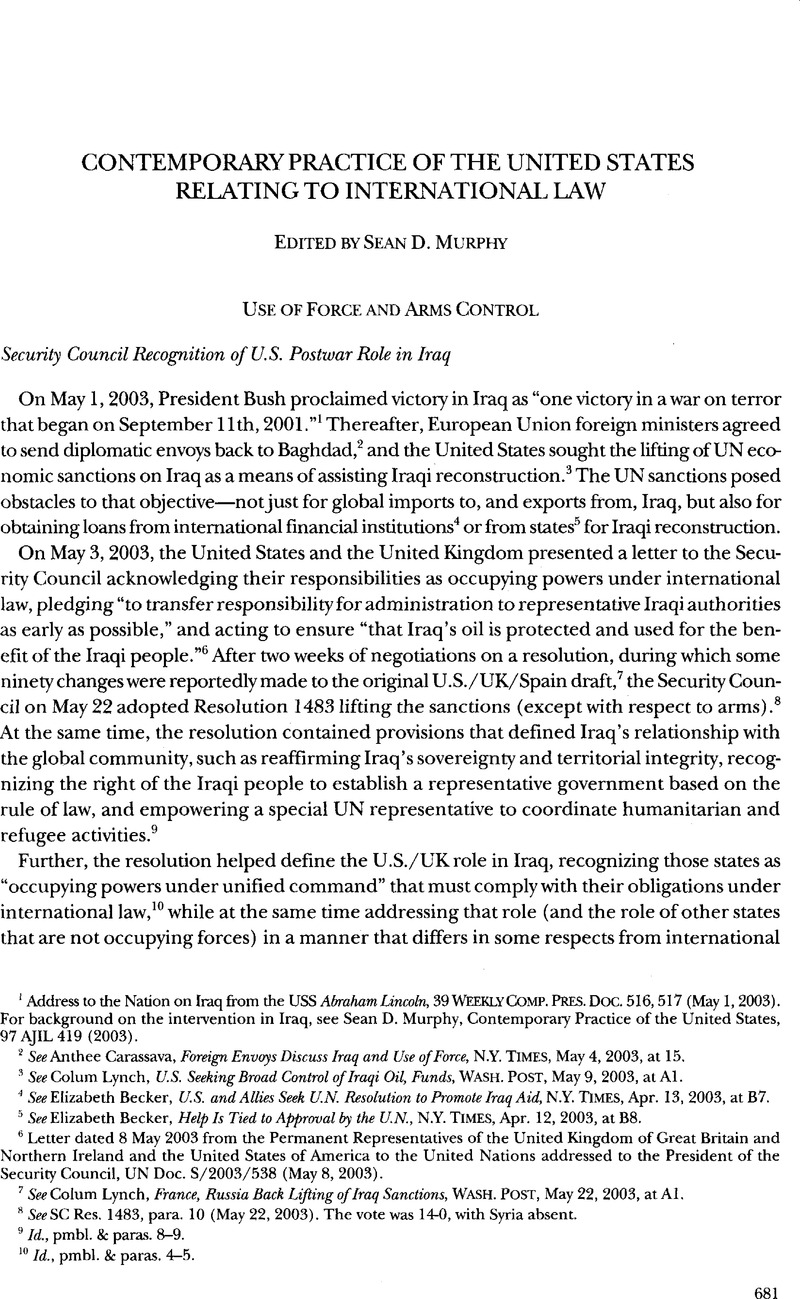No CrossRef data available.
Published online by Cambridge University Press: 27 February 2017

1 Address to the Nation on Iraq from the USS Abraham Lincoln, 39 Weekly Comp. Pres. Doc. 516, 517 (May 1, 2003). For background on the intervention in Iraq, see Sean D. Murphy, Contemporary Practice of the United States, 97 AJIL 419 (2003).
2 See Carassava, Anthee, Foreign Envoys Discuss Iraq and Use of Force, N.Y. Times, May 4, 2003, at 15.Google Scholar
3 See Lynch, Colum, U.S. Seeking Broad Control of Iraqi Oil, Funds, Wash. Post, May 9, 2003, at A1 Google Scholar.
4 See Becker, Elizabeth, U.S. and Allies Seek U.N. Resolution to Promote Iraq Aid, N.Y. Times, Apr. 13, 2003, at B7.Google Scholar
5 See Becker, Elizabeth, Help Is Tied to Approval by the U.N., N.Y. Times, Apr. 12, 2003, at B8.Google Scholar
6 Letter dated 8 May 2003 from the Permanent Representatives of the United Kingdom of Great Britain and Northern Ireland and the United States of America to the United Nations addressed to the President of the Security Council, UN Doc. S/2003/538 (May 8, 2003).
7 See Lynch, Colum, France, Russia Back Lifting of Iraq Sanctions, Wash. Post, May 22, 2003, at A1 Google Scholar.
8 See SC Res. 1483, para. 10 (May 22, 2003). The vote was 14–0, with Syria absent.
9 Id., pmbl. & paras. 8–9.
10 Id., pmbl. & paras. 4–5.
11 The use of Security Council resolutions, rather than international humanitarian law, as a central device for determining the rights and duties of an occupying power may be seen in several recent military deployments, such as those in Afghanistan and Kosovo.
12 SC Res. 1483, supra note 8, para. 4. By contrast, international humanitarian law disfavors changes in local laws and institutions by an occupying power. See Regulations Respecting the Laws and Customs of War on Land, annex to Convention [No. IV] Respecting the Laws and Customs of War on Land, Oct. 18, 1907, Art. 43, 36 Stat. 2277, 1 Bevans 631; Geneva Convention Relative to the Protection of Civilian Persons in Time of War, Aug. 12, 1949, Art. 47, 6 UST 3517, 3548, 75 UNTS 287, 318.
13 SC Res. 1483, supra note 8, paras. 12–14.
14 Id., pmbl. & para. 20.
15 Id., paras. 16–17.
16 Id., para. 22; see Exec. Order No. 13303, 68 Fed. Reg. 31,929 (May 28, 2003).
17 Id., para. 25.
18 See, e.g., Barringer, Felicity, U.N. Reaction to Resolution Seems Positive but Reserved, N.Y. Times, May 10, 2003, at A13.Google Scholar
19 See, e.g., DeYoung, Karen & Pincus, Walter, U.S. Hedges on Findinglraqi Weapons, Wash. Post, May 29, 2003, at A1 Google Scholar; Gellman, Barton, Odyssey of Frustration, Wash. Post, May 18, 2003, at A1.Google Scholar
20 See Miller, Judith, Trailer Is a Mobile Lab Capable of Turning Out Bioweapons, a Team Says, N.Y. Times, May 11, 2003, at 11 Google Scholar; Miller, Judith, U.S. Aides Say Iraqi Truck Could Be a Germ-War Lab, N.Y. Times, May 8, 2003, at A12 Google Scholar; Pincus, Walter & Dobbs, Michael, Suspected Bioweapon Mobile Lab Recovered, Wash. Post, May 7, 2003, at A1 Google Scholar.
21 Centrai, Intelligence Agency/Defense Intelligence Agency, Iraqi Mobile Biological Warfare Agent Production Plants 4 (May 28, 2003), at <http://www.cia.gov/cia/reports/iraqi_mobile_plants/>; see also Broad, William J., U.S., in Assessment, Terms Trailers Germ Laboratories, N.Y. Times, May 29, 2003, at A13 Google Scholar.
22 See Jehl, Douglas, Agency Disputes C.I.A. View on Trailers as Weapons Labs, N.Y. Times, June 26, 2003, at A1 Google Scholar; see also Miller, Judith & Broad, William J., Some Analysts of Iraq Trailers Reject Germ Use, N.Y. Times, June 7, 2003, at A1 Google Scholar.
23 See, e.g., Shadid, Anthony, Shiites Denounce Occupation, Wash. Post, May 20, 2003, at A1 Google Scholar.
24 See Coalition Provisional Authority [Iraq] Order No. 1: De-Baathification of Iraqi Society (May 16, 2003), at <http://www.defenselink.mil/dodgc/ia/docs/debaath.pdf>; Slevin, Peter, U.S. Bans More Iraqis from Jobs, Wash. Post, May 17, 2003, at A1.Google Scholar Various coalition authority documents, such as on weapons control, criminal law, and eviction of persons from illegally occupying public buildings, may be accessed at <http://www.defenselink.mil/dodgc/ia/>.
25 See Wilson, Scott, More Troops Deployed as New Iraqi Government Postponed, Wash. Post, May 18, 2003, at A22 Google Scholar; see also Chandrasekaran, Rajiv, Iraqis Say They Will Defy U.S. on Council Plan, Wash. Post, June 4, 2003, at A14 Google Scholar; Chandrasekaran, Rajiv, U.S. Sidelines Exiles Who Were to Govern Iraq, Wash. Post, June 8, 2003, at A21.Google Scholar
26 See Chandrasekaran, Rajiv, Appointed Iraqi Council Assumes Limited Role, Wash. Post, July 14, 2003, at A1.Google Scholar The council comprised thirteen Shiites, five Kurds, five Sunnis, one Christian, and one Turkmen. Three council members were women.
27 See Chandrasekaran, Rajiv, U.S. to Form New Iraqi Army, Wash. Post, June 24, 2003, at A1 Google Scholar.
28 See Graham, Bradley, U.S. to Help Finance Polish Peacekeepers, Wash. Post, May 6, 2003, at A13.Google Scholar
29 See Lancaster, John, India Rejects Request by U.S. for Iraq Force, Wash. Post, July 15, 2003, at A10 Google Scholar; DeYoung, Karen, 1,500 Spanish Troops to Aid Iraq Recovery, Wash. Post, May 8, 2003, at A21 Google Scholar; Germany Refuses to Join Iraq Peacekeepers, N.Y. Times, May 8, 2003, at A13.